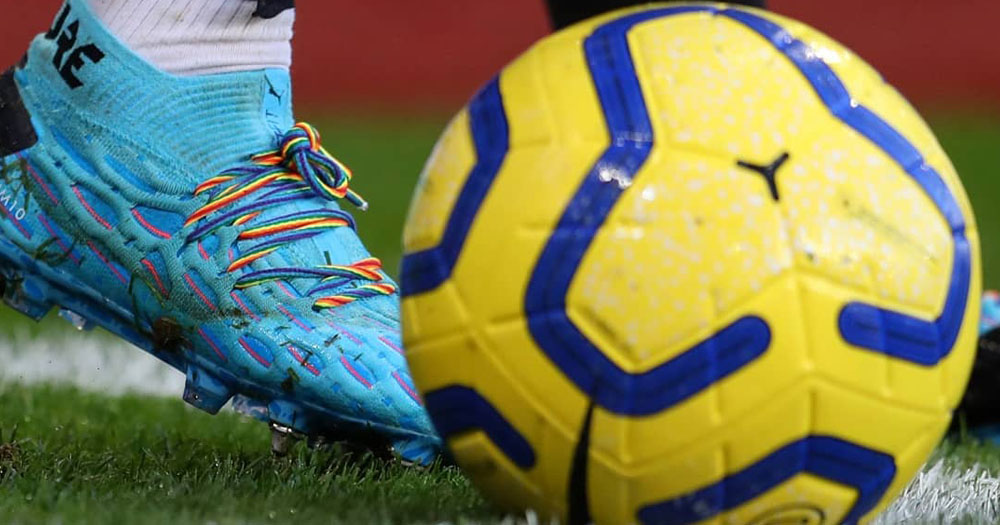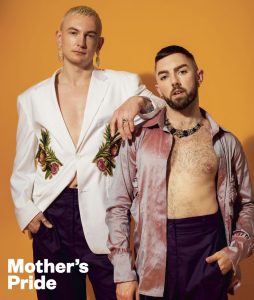Despite many queer women representing Ireland on an international sporting level, the lack of openly queer men has raised questions about the continued levels of homophobia in men’s sport. Alice Linehan asks why this is.
When it comes to LGBTQ+ athletes, Ireland boasts an impressive selection of active stars. There’s Olympic boxing gold medalist Kellie Harrington, three-time Paralympic cycling champion Katie-George Dunlevy, Arsenal footballer and Republic of Ireland captain Katie McCabe, former Irish rugby international and current Dublin GAA superstar Hannah Tyrrell – to simply call it “impressive” is almost an insult.
While this list is by no means exhaustive, it is evidently dominated by female athletes, a trend that translates globally, especially in elite-level team sports. While Ireland does have its current representatives including Olympic taekwondo fighter Jack Woolley and Exeter-bound rugby player Jack Dunne, it is obvious that the male sporting sphere has not quite kept pace with that of the female in terms of LGBTQ+ inclusion, but why?
It is not that queer men are uninterested in participating in sport – that theory can be quickly debunked by examining the popularity of LGBTQ+ inclusive clubs in the country and worldwide – unfortunately, the answer given by most is that an environment infused with homophobia, whether blatant or subtle, in the dressing room or in the stands, still permeates through male sports at all levels today. This causes some to drop their passions, and others to remain closeted, especially in the public eye and while actively playing.
It is ignorant to believe that homophobia – be it in sport or beyond – is no longer an issue as some people suggest. Each year the question is raised: “Why is Pride still needed?” In fact, a series of recent events involving anti-LGBTQ+ violence might even suggest that things are actually regressing in terms of queer acceptance in society, and as a result, also on the pitches.
Speaking to Richie Fagan, a member of the Dublin-based inclusive rugby club the Emerald Warriors, he recalled some appalling instances of late where the team had been subjected to homophobic abuse.
“We’ve seen a few players be targeted at games. It’s interesting, at two different games that particular members were targeted or abused with some slurring, they were the straight people on our team,” Richie commented.
“But it was still an awful experience for us because we were like- there’s no need for this. It’s particularly strange given the amount of positive experiences that we’ve had over the years within the league. We were finding it very hard to understand.”
Emerald Warriors RFC stand with our fellow English IGR clubs in condemning the English RFU in their recommendation to ban all trans women rugby players from playing in womens competition. If the RFU council vote to adopt this recommendation it will be retrograde step for the pic.twitter.com/M68JPNz3QH
— Emerald Warriors RFC (@ewrfc) July 25, 2022
Richie has been a member of the Warriors since 2012, and overall, there have been few instances of homophobia during his ten-year spell playing the sport. Most teams in the league are great allies, but recent events have reminded all involved that more still needs to be done to ensure respect, equality and inclusion for LGBTQ+ athletes.
“I do think there’s a greater call and a greater need from organisations at the higher level to be not just doing this as a once-a-year stamp. This is what’s killing us,” Richie expressed. “Pride month can come and go so quickly, and everyone jumps on board, but realistically, this is something that needs to be spoken about or engaged with once a month.”
Richie added that the Warriors have been working closely with the Leinster branch and the IRFU to try and get ahead of the issue, and change things for the better. However, it seems like every time the male sporting world takes a progressive stride forward, it also takes two steps back. Football is the biggest sport in the world, yet 17-year-old Jake Daniels made history in May by becoming the only active openly gay professional male footballer in the UK, and just the second globally. While it was a groundbreaking moment with many positives to take from it, Sky Sports had to mute the comments on their social media posts announcing the news because of online trolls. In the same week, Paris Saint-Germain footballer Idrissa Gueye reportedly refused to play a match because he was being asked to wear a jersey that featured the rainbow flag.
John McGouran, the Community Officer for Dublin-based Shelbourne FC, one of the most successful clubs in the country, was 24 years old when he came out, a decision that ultimately ended his footballing career. Speaking on the state of homophobia in the sport at the moment, he commented: “I think at a local level it’s changing, and that’s very positive. However, if you look at it at a global level perhaps, there’s still a long way to go.”
He added that the concern is no longer the reaction of the dressing room to a player being gay, “the challenge is found when they take to the pitch, and you have the supporters of the away side, you have the players of the away side, and they’re always looking for some way to try and get into your head.” This is when players will be targeted for things like sexual orientation. “I still hear it around the grounds in the League of Ireland sadly,” John continued. “I think attitudes are changing, but slowly.”
With the issue still prevalent, one begins to wonder can there ever be a day when non-heterosexual sports people are truly welcome, respected and playing without fear. The answer is yes, and it’s not just a hypothetical, imaginary world, it is the female football game.
Great to be able to work with @AVIVAIRELAND again! Happy pride month #SafeToDream ?️? https://t.co/RdpMtoPg64
— Katie McCabe (@Katie_McCabe11) June 19, 2020
Shelbourne are the reigning champions of the Women’s National League, with current and former players including Irish internationals Katie McCabe, Jamie Finn, Saoirse Noonan, Isibeail Atkinson, and many more.
“I spend quite a bit of time around the women’s team,” John began. “There’s no difference in how they approach the game, how they prepare for the game, how they train for the game, no difference whatsoever to the men. But the environment that they create is very different. The men’s game is still very much this ‘lad culture’, this ‘banter’ that somehow will quite often go back to some sort of a homophobic slur. It’s quite bizarre.”
“For the women, it’s just a non-issue,” he stated. However, it should be noted that as of late there has been a growing issue surrounding Transgender inclusion within the female sporting sphere – a topic that deserves its own article.
When asked what needs to be done to improve the situation in male sports, John offered a similar answer to that of Richie Fagan. “I think the governing bodies need to take a position on it,” he remarked. “I think what we need to see is people really standing up and talking about the issue and talking about how inclusive they want their sport to be. Because, whatever else, they’re missing out on a huge pool of talent.
“There’s Jake Daniels, he scores 30 goals a season. You tell me any club in the world who wouldn’t want a player who scores 30 goals a season. And there must be more like Jake Daniels out there, dozens, hundreds of them.
“So they need to open up their minds to a whole new talent pool, not just on the pitch but off the pitch. Because LGBT people are great administrators, great volunteers, and can bring so much to your club – real diversity of thought and creativity,” he added.
“Our club would not be anywhere near as successful without our LGBT+ players and volunteers and people on and off the pitch.”
According to the Irish Sports Monitor 2021, only 59% of people agree that sports clubs are welcoming to those from the LGBTQ+ community. In addition, 56% of clubs are unaware of any queer members or volunteers within their organisation.
On the issue of sports governing bodies taking a firmer stance on homophobia and LGBTQ+ participation, Sporting Pride outlined a few examples of what has been done to date. This includes organisations undertaking training with the likes of ShoutOut to better understand queer issues, the GAA working on inclusion policies that feed down to club level, the Gaelic Players Association conducting research that showed 99% of intercounty players would support a teammate who came out, and a number of National Governing Bodies (NGBs) and Local Sports Partnerships (LSPs) working with Sporting Pride on various events.
Sport Ireland published its updated policy on diversity and inclusion in May 2022, examining the barriers to sport that queer people and other minorities face, and also outlining its objectives and desired outcomes for the future. These fall under five policy pillars including Change, Communication, Access, Capacity and Leadership, with each pillar containing certain actions to help Sport Ireland achieve its goals and create a more inclusive sporting environment in the country.
While Sporting Pride noted the importance of acknowledging the positive efforts being made, it also highlighted the need to educate and support local-level leaders who are highly influential when it comes to creating safe spaces for queer athletes. Furthermore, the organisation stated: “Showing support outside of Pride month is also essential for long-term inclusion plans. Many NGBs and LSPs, as well as Sport Ireland, show support throughout June in many ways, which is amazing, but in order to tackle homophobia they need to consider ways to support the community 365 days a year.”
© 2022 GCN (Gay Community News). All rights reserved.
This article was published in the print edition Issue No. 372 (June 10, 2022). Click here to read it now.
Support GCN
GCN is a free, vital resource for Ireland’s LGBTQ+ community since 1988.
GCN is a trading name of National LGBT Federation CLG, a registered charity - Charity Number: 20034580.
GCN relies on the generous support of the community and allies to sustain the crucial work that we do. Producing GCN is costly, and, in an industry which has been hugely impacted by rising costs, we need your support to help sustain and grow this vital resource.
Supporting GCN for as little as €1.99 per month will help us continue our work as Ireland’s free, independent LGBTQ+ media.

